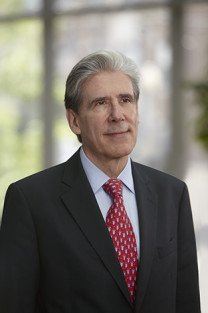This special issue of Harvard Public Health is devoted to the School’s first century. It is not meant to be a comprehensive or exhaustive survey. Rather, we want to give readers—students, faculty, staff, and alumni, as well as those who are new to the School or simply want an overview of the field since 1913—a lively and broad perspective of HSPH’s accomplishments, as well as a glimpse of where it is headed in its second century. And because enlightened philanthropy underlies many of our achievements, our Winter 2014 issue will focus on how it has shaped HSPH and continues to open up intriguing new research directions.
As we approach the School’s centennial, I have been reflecting upon the phrase “full circle”—which seems relevant in so many ways to this momentous anniversary.
Most obvious, of course, are the two formidable circles in the number 100. HSPH is the longest continuously operating school of public health in the world. It was established at a time when tried-and-true interventions such as sanitary engineering were being wed to a new scientific base stemming from the germ theory of disease and the exciting discoveries in microbiology that followed.
To come full circle means to return to one’s roots. As this special keepsake issue of Harvard Public Health makes clear, the public health mission is both timely and timeless. The problems that preoccupied us a century ago still preoccupy us. Most of the titles of the 73 courses offered in our first catalog resonate in 2013, from Infant Mortality and Food Analysis to Climatology and Practical Health Administration.
Back then, the aim was an education that would prepare students to be thinkers and doers—and that remains true, though the School has been continually refining its educational philosophy, changing in response to new needs and pedagogical insights. Today, HSPH aims to graduate “T-shaped leaders”: those with both in-depth knowledge in specialized areas and a broad set of skills that enables them to work across many disciplines.
Around the world, advances in knowledge about how to protect the public’s health have doubled life expectancy. But in today’s interconnected world, this progress is imperiled by four major threats. One threat consists of old and new pandemics—from diabetes and obesity to avian flu and antibiotic resistance. In response, HSPH is challenging accepted wisdom and pushing back the frontiers of knowledge for the common good. We are building on lifesaving work that has slowed the spread of HIV/AIDS; harnessing cellphone technologies to better understand, and perhaps halt, the spread of malaria; and discovering molecular codes that influence how and when we get sick.
Another threat involves harmful physical and social environments. Our faculty has documented how deprivation, discrimination, toxic physical and social conditions, and the choices we make about how we live all play a role in disease. The School is in the vanguard of efforts to both change individual behavior and address the larger structural forces at play.
A third threat includes poverty and humanitarian crises. The Humanitarian Academy at Harvard—the first comprehensive educational program for aid workers offered by a major global university—teaches humanitarian workers to operate effectively in crises and trains future leaders of aid agencies and government programs. Our Women and Health Initiative is working to change the circumstances that threaten the lives and livelihoods of women and families around the world.
The fourth threat centers on failing health systems. HSPH faculty members are identifying ways to prevent costly and life-threatening medical errors, determining which prevention programs and medical treatments deliver better care more efficiently, and ensuring that access to affordable care is viewed universally as a right, not a privilege. The School is also reaching globally to health leaders at all stages of their careers, through programs that help them achieve policy goals by equipping them with new information, resources, and connections.
If we have made progress against these four threats, it’s partly because of another circle—the circle of knowledge. This virtuous circle begins with research, the centerpiece of the School’s activities from the start. Scientific discoveries are taken up and replicated through education. They ripple out into the wider world through translation—both completing the circle and starting a new one, since on-the-ground experience feeds new research questions.
The beauty of coming full circle also has a very personal meaning for me. On a fellowship at Children’s Hospital, my father, Dr. Silvestre Frenk, studied the metabolism and biochemistry of undernutrition in a building on Shattuck Street that had once housed HSPH. As babies, my twin sister and I spent most of our first year in Boston, often accompanying my mother to pick him up after work in his basement laboratory. Little did I know that I would come full circle geographically to serve as dean just a few blocks away.
In 1984, when Mexico’s National Institute of Public Health was launched, another circle was drawn. Harvey Fineberg had just been named HSPH’s new dean. I traveled to Boston to ask him to serve on an international advisory committee for my fledgling institute. Harvey eagerly signed on—and with that simple act of generosity, helped ensure success during the crucial formative years of the institute. Thus began a circle of partnership and collegiality that is often at the heart of success in our field.
A centennial is an occasion to circle around dreams and ambitions, successes and failures, teaching and learning, human well-being as it is and as it could be. To the faculty, students, and staff who have made Harvard School of Public Health the pre-eminent institution it is today, I am profoundly grateful. At the start of our second century, we look forward to drawing an even wider circle of visionary science and powerful ideas for a healthier world.
Julio Frenk
Dean of the Faculty and
T & G Angelopoulos Professor of Public Health
and International Development,
Harvard School of Public Health
Download a PDF of Full circle here
